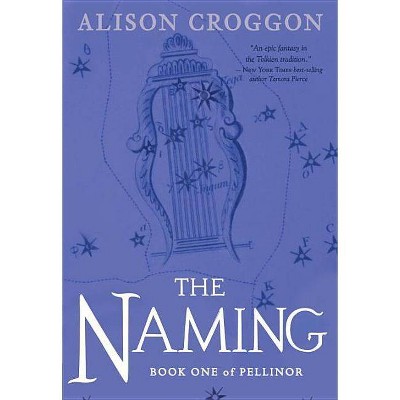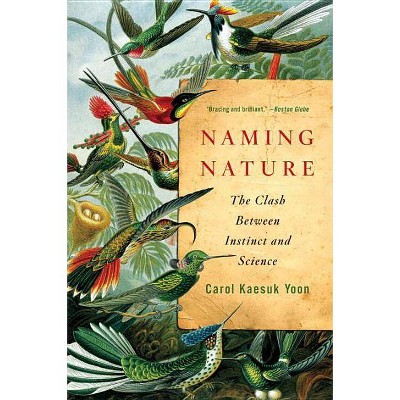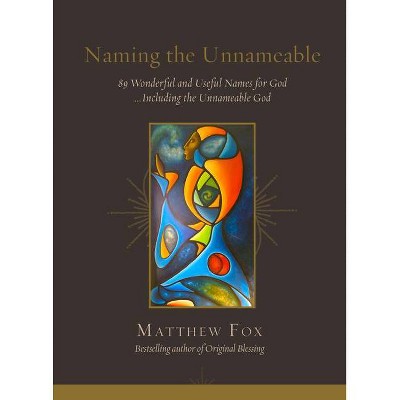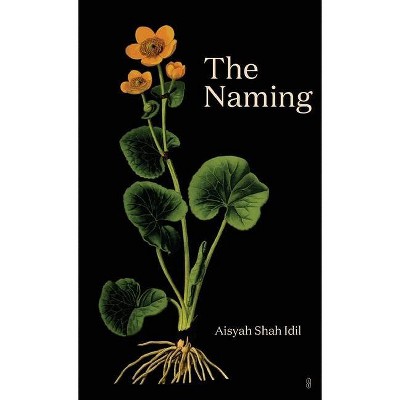Naming Rites - by Gary Boelhower (Paperback)
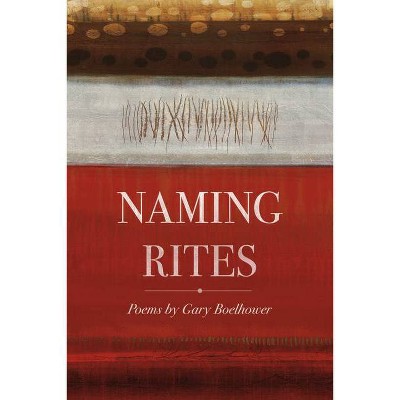
Similar Products
Products of same category from the store
AllProduct info
<p/><br></br><p><b> About the Book </b></p></br></br>A passionate heart finds expression in these lyrical poems that merge the earthly and divine: how to name it all?<p/><br></br><p><b> Book Synopsis </b></p></br></br><p>Gary Boelhower's second major collection includes sixty-five poems that explore the ways we are named and branded with multiple identities, a clay vessel molded and imprinted from the inside and the outside by those who know us or think they do; by wounds, worries, stones, and nicknames; by place and absence; by teachers and traitors.</p><p><b>Gary Boelhower</b> has taught ethics, leadership, and spirituality at the undergraduate and graduate levels for thirty years. He is the author of <i>Marrow, Muscle, Flight: Poems</i>, which won the Midwest Book Award for poetry.<p/><br></br><p><b> Review Quotes </b></p></br></br><br><em>Naming Rites</em> is such a generous collection it offers both blessings and confessions, dirt and bread, miracles and explosions, cruelty and mercy, great blue herons who resemble monks and blue jays clowning around, a lover's tender touch and the horrors of the nightly news. In second grade, Gary Boelhower admits, he won 'the glow-in-the-dark statue of Mary, ' and his religious drive, now mature, is still alive in these poems. They aim for (and often achieve) not just a personal record but transubstantiation, transforming experience into wisdom, fear into freedom, language into song. <em>Naming Rites</em> is the autobiography of a soul, reaching out beyond the boundaries of the self.--Bart Sutter, author of <em>Cow Calls in Dalarna</em> and <em>Chester Creek Ravine: Haiku</em> <p/><em>Naming Rites</em> by Gary Boelhower rings with an immense rhythm and rises 'out of the earth/ in waves, music, birth.' The cadence is measured and the titles have Biblical echoes. The words shine with grace. In the Garden of Eden, Adam and Eve were granted the right to name the animals. Inside the covers of this book, these narrative poems examine the myriad ways that we name others, ourselves, and our experience. <p/>As a gay man and a professor of ethics and religion, Gary Boelhower walks with courage in the world, and his poems are fierce and tender. He evokes the power of Sophia, and he searches and finds soul in the '...bright vesicle in the vestibule of chance / in the palm of the heart.' In one poem Preparing the Soil, he tells a story of summers on a farm, riding in the tractor. Once, his uncle scooped a handful of the fine and warm earth, ashes and dust, but also the place for seeds. <p/>The poems trace scars of abuse but also the marvels of wing and grasshopper and dance. Some poems are love poems like the Songs of Solomon. There are many that celebrate life, like A Song of the Salmon. There is humor and pathos in the poem Homeland Poetry. He explores memory and experience, both light and dark. Boelhower knows the things that haunt a soldier home from the war. He contemplates the red wire of a suicide bomber, the hunger of starving children, the frail machinery of the body, and the emotional scars of sexual abuse. He doesn't turn away from the names that are epithets, aspersions, labels, and whispered in shame. These poems claim the right to name one's self and to claim one's body, passion, love and desire. <p/>This is a spiritual book, a mystical one, and one grounded in the natural landscape. The simple act of learning to articulate and to name has the power to heal. This poet presents the reader with a rich place to plant the seeds of hope and forgiveness. In a sensual collection, Gary Boelhower gathers the difficult world and finds the 'common code swimming / in the helix of your muscle and marrow.'"--Sheila Packa, former Duluth Poet Laureate and author of <em>Echo & Lightning, </em> <em>Cloud Birds, </em> and <em>Night Train Red Dust</em> <p/>Gary Boelhower's poems resist convention and confinement even as they speak deeply of and from history, family, and community. The persona names and narrates himself into being as he chronicles profound and tender encounters as well as 'tectonic shifts and betrayals.' Software engineers meditate, children go hungry, and faith is lost and reconfigured. 'Let me not forget to be what I have spoken, ' Boelhower reminds himself and his readers. <em>Naming Rites</em> is an important and sustaining book for our times, with its 'cadence that calls us into the streets with voices / of protest and hope.'--Julie Gard, author of <em>Home Studies</em><br><br><br><i>Naming Rites</i> is such a generous collection it offers both blessings and confessions, dirt and bread, miracles and explosions, cruelty and mercy, great blue herons who resemble monks and blue jays clowning around, a lover's tender touch and the horrors of the nightly news. In second grade, Gary Boelhower admits, he won 'the glow-in-the-dark statue of Mary, ' and his religious drive, now mature, is still alive in these poems. They aim for (and often achieve) not just a personal record but transubstantiation, transforming experience into wisdom, fear into freedom, language into song. <i>Naming Rites</i> is the autobiography of a soul, reaching out beyond the boundaries of the self.--Bart Sutter, author of <i>Cow Calls in Dalarna</i> and <i>Chester Creek Ravine: Haiku</i> <p/><i>Naming Rites</i> by Gary Boelhower rings with an immense rhythm and rises 'out of the earth/ in waves, music, birth.' The cadence is measured and the titles have Biblical echoes. The words shine with grace. In the Garden of Eden, Adam and Eve were granted the right to name the animals. Inside the covers of this book, these narrative poems examine the myriad ways that we name others, ourselves, and our experience. <p/>As a gay man and a professor of ethics and religion, Gary Boelhower walks with courage in the world, and his poems are fierce and tender. He evokes the power of Sophia, and he searches and finds soul in the '...bright vesicle in the vestibule of chance / in the palm of the heart.' In one poem Preparing the Soil, he tells a story of summers on a farm, riding in the tractor. Once, his uncle scooped a handful of the fine and warm earth, ashes and dust, but also the place for seeds. <p/>The poems trace scars of abuse but also the marvels of wing and grasshopper and dance. Some poems are love poems like the Songs of Solomon. There are many that celebrate life, like A Song of the Salmon. There is humor and pathos in the poem Homeland Poetry. He explores memory and experience, both light and dark. Boelhower knows the things that haunt a soldier home from the war. He contemplates the red wire of a suicide bomber, the hunger of starving children, the frail machinery of the body, and the emotional scars of sexual abuse. He doesn't turn away from the names that are epithets, aspersions, labels, and whispered in shame. These poems claim the right to name one's self and to claim one's body, passion, love and desire. <p/>This is a spiritual book, a mystical one, and one grounded in the natural landscape. The simple act of learning to articulate and to name has the power to heal. This poet presents the reader with a rich place to plant the seeds of hope and forgiveness. In a sensual collection, Gary Boelhower gathers the difficult world and finds the 'common code swimming / in the helix of your muscle and marrow.'"--Sheila Packa, former Duluth Poet Laureate and author of <i>Echo & Lightning, </i> <i>Cloud Birds, </i> and <i>Night Train Red Dust</i> <p/>Gary Boelhower's poems resist convention and confinement even as they speak deeply of and from history, family, and community. The persona names and narrates himself into being as he chronicles profound and tender encounters as well as 'tectonic shifts and betrayals.' Software engineers meditate, children go hungry, and faith is lost and reconfigured. 'Let me not forget to be what I have spoken, ' Boelhower reminds himself and his readers. <i>Naming Rites</i> is an important and sustaining book for our times, with its 'cadence that calls us into the streets with voices / of protest and hope.'--Julie Gard, author of <i>Home Studies</i><br><br><p/><br></br><p><b> About the Author </b></p></br></br>Gary Boelhower's poetry has been published in anthologies: Amethyst and Agate: Poems of Lake Superior, Holy Cow! Press (2015), The Heart of All That Is, Holy Cow! Press (2013), The Cancer Poetry Project 2, Tasora Books (2013) Beloved on the Earth: 150 Poems of Grief and Gratitude, Holy Cow! Press (2009), Trail Guide to the Northland Experience in Prints and Poetry, Calyx Press Duluth (2008), and County lines: 87 Minnesota Counties 130 Minnesota Poets, Loonfeather Press (2008) and in journals and magazines: America, Duluth Superior Symphony Orchestra Magazine, The Freshwater Review, Lake Superior Magazine, New Millenium Writings, Out of Words, Prove, Shavings, and Willow Review. His 2011 collection of poems, Marrow, Muscle, Flight (Wildwood River Press) won the Midwest Book Award. He was awarded the Foley Prize in poetry from America magazine in 2012 and a career development grant from the Arrowhead Regional Arts Council in 2010. <p/>His recent nonfiction books include Choose Wisely: Practical Insights from Spiritual Traditions, Paulist Press (2013) and Mountain 10: Climbing the Labyrinth Within, (co-authored with Joe Miguez and Tricia Pearce) Mountain Ten Resources (2013). Boelhower teaches at The College of St. Scholastica in Duluth, Minn. in ethics, spirituality, and leadership. He has held leadership positions in higher education, including chair of humanities, dean of life-long learning, dean of graduate studies and vice president for academic affairs. He has created non-profit community organizations for feeding the hungry and for adult literacy. He has consulted with and provided training for a broad range of organizations on dialogue, authentic leadership, values and vision, the respectful workplace, and wise decision-making.
Price History
Price Archive shows prices from various stores, lets you see history and find the cheapest. There is no actual sale on the website. For all support, inquiry and suggestion messages communication@pricearchive.us


